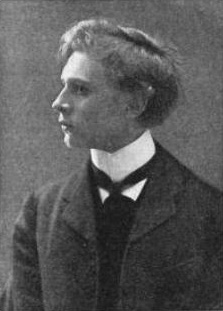Percy Grainger
Percy Aldridge Grainger (8 July 1882 – 20 February 1961) was an Australian-born composer, arranger, and pianist. In the course of a long and innovative career, he played a prominent role in the revival of interest in British folk music in the early 20th century. Although much of his work was experimental and unusual, his best-known pieces are still frequently performed.
Early Life[edit | edit source]
Percy Grainger was born in Brighton, a suburb of Melbourne, Australia. His father, John Grainger, was an architect from London, and his mother, Rose Aldridge, was the daughter of hotel proprietors from Adelaide. Grainger showed prodigious talent in music at an early age. He was initially taught piano by his mother, and he gave his first public concert at the age of ten. In 1895, the Grainger family moved to Europe to further Percy's musical education in Frankfurt, Germany, where he attended the Hoch Conservatory.
Career[edit | edit source]
Grainger's career was marked by his innovative approach to composition and performance. He was deeply interested in folk music and made numerous field recordings and transcriptions of folk songs from England, Denmark, and Norway. His interest in folk music significantly influenced his compositions, which often incorporated folk themes and idioms.
Grainger's best-known work is probably Lincolnshire Posy (1937), a suite for wind band that is based on folk songs he collected in Lincolnshire. He also arranged many of these folk tunes for piano and other instruments. Other notable compositions include Country Gardens, Molly on the Shore, and Shepherd's Hey.
Grainger was also an innovator in the field of music performance and education. He was one of the first to use the phonograph for recording folk music and experimented with unusual instruments and tunings. He advocated for the use of electronic instruments and developed the "Free Music Machine", which prefigured later electronic musical synthesizers.
Personal Life[edit | edit source]
Grainger's personal life was marked by his close relationship with his mother, who managed his career until her death in 1922. After her death, Grainger's mental health deteriorated, and he struggled with depression and anxiety for the rest of his life. He married Swedish poet and artist Ella Viola Ström in 1928, who supported him through his mental health struggles.
Legacy[edit | edit source]
Percy Grainger died in White Plains, New York, in 1961. He left behind a rich legacy of music that continues to be performed and recorded. His innovative approaches to composition, performance, and music education have had a lasting impact on the music world. The Grainger Museum in Melbourne, Australia, dedicated to his life and work, holds a vast collection of his manuscripts, letters, instruments, and personal belongings.
Search WikiMD
Ad.Tired of being Overweight? Try W8MD's physician weight loss program.
Semaglutide (Ozempic / Wegovy and Tirzepatide (Mounjaro / Zepbound) available.
Advertise on WikiMD
|
WikiMD's Wellness Encyclopedia |
| Let Food Be Thy Medicine Medicine Thy Food - Hippocrates |
Translate this page: - East Asian
中文,
日本,
한국어,
South Asian
हिन्दी,
தமிழ்,
తెలుగు,
Urdu,
ಕನ್ನಡ,
Southeast Asian
Indonesian,
Vietnamese,
Thai,
မြန်မာဘာသာ,
বাংলা
European
español,
Deutsch,
français,
Greek,
português do Brasil,
polski,
română,
русский,
Nederlands,
norsk,
svenska,
suomi,
Italian
Middle Eastern & African
عربى,
Turkish,
Persian,
Hebrew,
Afrikaans,
isiZulu,
Kiswahili,
Other
Bulgarian,
Hungarian,
Czech,
Swedish,
മലയാളം,
मराठी,
ਪੰਜਾਬੀ,
ગુજરાતી,
Portuguese,
Ukrainian
Medical Disclaimer: WikiMD is not a substitute for professional medical advice. The information on WikiMD is provided as an information resource only, may be incorrect, outdated or misleading, and is not to be used or relied on for any diagnostic or treatment purposes. Please consult your health care provider before making any healthcare decisions or for guidance about a specific medical condition. WikiMD expressly disclaims responsibility, and shall have no liability, for any damages, loss, injury, or liability whatsoever suffered as a result of your reliance on the information contained in this site. By visiting this site you agree to the foregoing terms and conditions, which may from time to time be changed or supplemented by WikiMD. If you do not agree to the foregoing terms and conditions, you should not enter or use this site. See full disclaimer.
Credits:Most images are courtesy of Wikimedia commons, and templates Wikipedia, licensed under CC BY SA or similar.
Contributors: Prab R. Tumpati, MD






